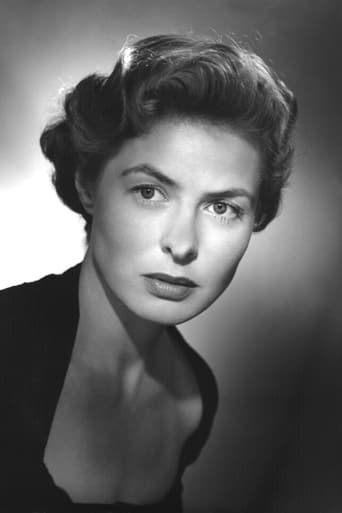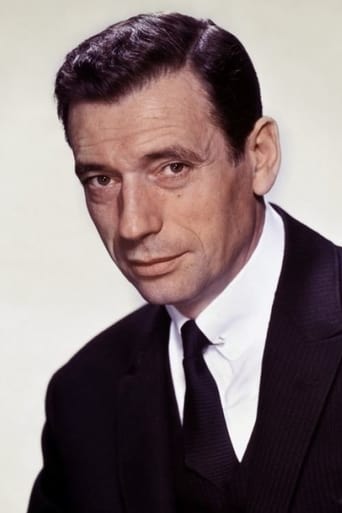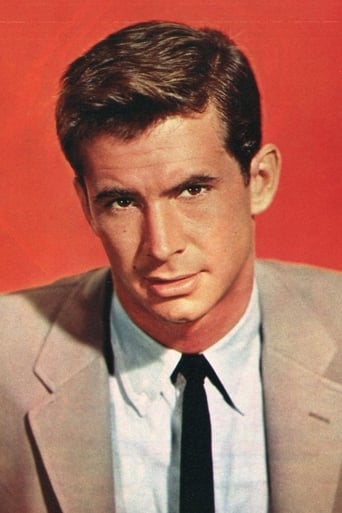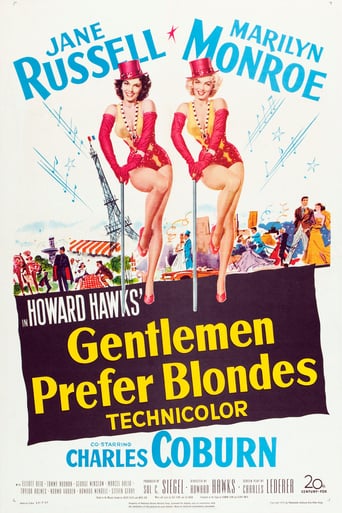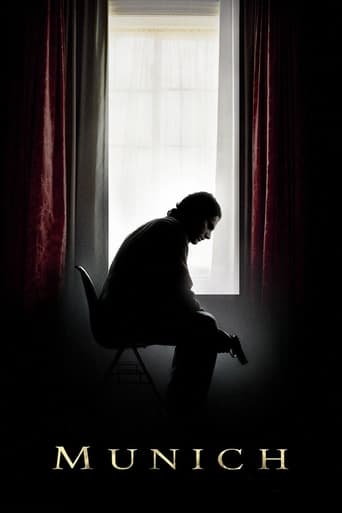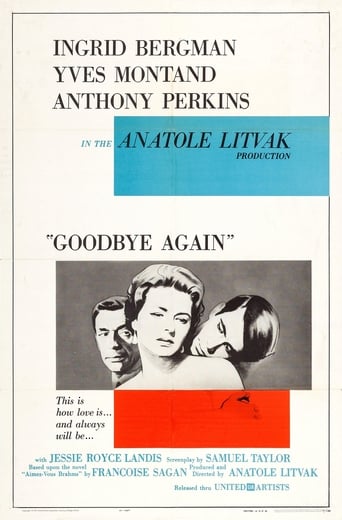
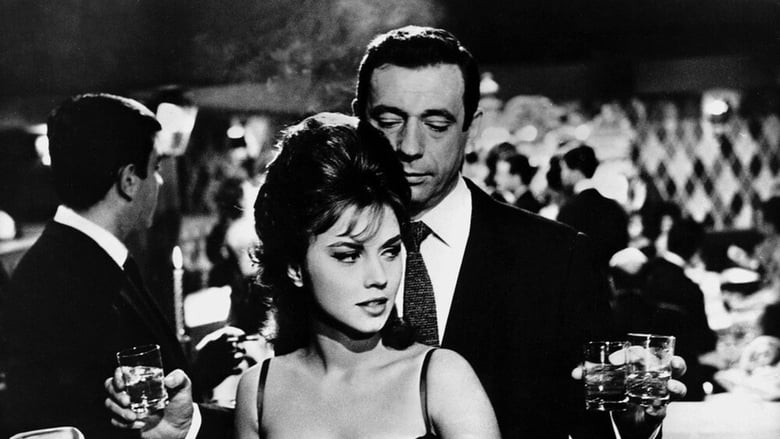
Goodbye Again (1961)
Middle-aged businesswoman Paula Tessier resists the advances of Philip Van der Besh, the 24-year-old son of one of her clients. But when her longtime paramour, Roger Demarest, begins yet another casual affair with a younger woman, Paula decides that two can play that game. However, it seems that society looks differently at May-December romances when the woman is the older partner.
Watch Trailer
Cast
Similar titles

Reviews
It is not deep, but it is fun to watch. It does have a bit more of an edge to it than other similar films.
what a terribly boring film. I'm sorry but this is absolutely not deserving of best picture and will be forgotten quickly. Entertaining and engaging cinema? No. Nothing performances with flat faces and mistaking silence for subtlety.
The film's masterful storytelling did its job. The message was clear. No need to overdo.
This is one of the best movies I’ve seen in a very long time. You have to go and see this on the big screen.
it is the beauty of inspired meeting. the novel , the director and the actors. the dialogs and something sad and graceful and melancholic. and almost unique. a film about love and about the search of sense for love in a manner who reflects great talent of actors and the precision of the work of director. a film who is not exactly great but beautiful at all. seductive scene by scene, fragile and mysterious in a special form. a film who reminds basic searches and desires. in the best style. the presence of Sagan 's words is one of its fundamental virtues. because it is adaptation of a good novel. who, in the Litvak's science of detail reflects new, fascinating nuances.
In Paris, matronly interior decorator Ingrid Bergman (as Paula Tessier) fears, at 40, she's getting old. Playboy businessman Yves Montand (as Roger Demarest) cancels a dinner date with Ms. Bergman. After their next engagement, Mr. Montand doesn't stay for sex with Bergman. Instead, he goes out to pick up a younger woman. Obviously, their five year affair has lost its luster. Later, Bergman meets a wealthy client's son, bubbly law student Anthony Perkins (as Philip Van der Besh). He's 25-years-old. Immediately attracted to his mom's decorator, Mr. Perkins takes Bergman for a ride in his fast sports car and invites her to lunch...Produced and directed by Anatole Litvak, "Goodbye Again" features a trio of stars who certainly looked better on paper. We don't see much for Bergman to find attractive in either Perkins or Montand. Frankly, Bergman isn't especially attractive to either man, either. There is little passion in either pairing. Bergman is morbid. Perkins too silly. Montand seems disinterested even in the sexpots that appear in his bed. Other than having the younger heads popping in front of the camera, Mr. Litvak's dance scene near the end looks good. He uses automobiles to parallel his characters; at one point, Bergman's tears cover her car's windshield.**** Goodbye Again (5/61) Anatole Litvak ~ Ingrid Bergman, Anthony Perkins, Yves Montand, Jessie Royce Landis
All three characters are distinct in their expression and pursuit of "being loved." We have all encountered a Roger - cool, indifferent, the free spirit that cannot be tamed, and furthermore, does not WANT to be tamed. Yet he cannot be alone. We all have personally experienced the terrifying moment in our lives of becoming a man/woman over night. Phillip is clearly not prepared to emerge from his childhood of security and entitlement, his choices always having been guided by a mother, or the underlying norms of his social circle. The daunting task of assuming his own identity leads him to attach his self to Paula, forming a classic example of codependency. His choice for an older woman is his way of prolonging the actuality of having to develop his own identity, his own path. For example, when Paula goes to work his day consists of nothing but finding things to do to kill time until she is back to entertain him. It is as if without her presence he is on the "pause button," and only resumes life on her cue. Paula, however, sees this as is not pleased. Paula is the most interesting character, because her feelings and behavior in this film are so diverse that just when we think it is apparent how she is feeling she does something that questions our previous assumption. Roger is the classic ladies' man, his stance staunch against the wind. Phillip is the typical tragedy that happens to a boy who has been given everything, yet has never asked for anything. These two men are simply unilateral characters framing the abstract piece that is Paula. Does she really want Roger to commit to her? We think the obvious answer is yes, but then we see her with young Phillip - we see her with this sexual energy and freedom that she cannot suppress, and we wonder whether Phillip is simply an outlet for her emotional frustrations with Roger or whether he is not actually a venue for her to express her own longings for excitement, trysts and desires. Yet we learn more from the scene in the bedroom, with the single shot of Paula lying in bed after (we assume) Paula and Phillip have shared an intimate moment. Her facial expression tells us she has reservations about leading this lifestyle; she knows it will not work. It is almost as if in that moment, watching Paula's facial expression, we are swept back to a time when we ourselves were caught in a relationship, or an act, that we knew were were going to regret later, but could not stop ourselves in the moment. Diane Lane's subway scene in "Unfaithful" draws many similarities to Ingrid Bergman's bedroom scene. Another scene where Paula bears her emotions, yet reluctantly, is when she is having lunch with Roger after he has just returned from his 10 day trip. She reveals to him that her friendship with Phillip has become more serious. She tells him this not for honesty, nor to inform him that she is moving on, yet she tells him this to see his reaction. This is a pitiful scene. When Paula complains that she always has to hear about his girls, he says something along the lines of that at least his is normal. In other words, he has called Paula a joke. There is a beat, and we feel the impact that she feels. As she stumbles away from the table we see exactly how vulnerable she is, how insecure she actually is about her age. We don't want to, but we feel sorry for her. We feel pity for her because there are moments when she is with Phillip when she appears truly happy, and yet the stigma attached to the relationship causes just as much misery. However, in the end, when we learn that she will never find that true happiness (with love), we are hesitant to feel that same sympathy for her. Is it because she pursued a love that she knew she would have to share? Or is it because she sacrificed the only love that ever really made her feel happy, and young?
Ingrid Bergman plays Paula Tessier, a 40ish interior decorator with a long-running relationship with a chronically unfaithful man, Roger Demarest (Yves Montand). The twenty-something son of one of her clients, Phillip (Anthony Perkins), falls in love with her and she turns the tables on Roger by having an affair of her own. Bergman gives a solid, heartfelt performance and Montand is so attractively world-weary, it's easy to see why she can't fall out of love with him. Perkins' Phillip is a spoiled mama's boy and it's hard to understand the Bergman character's attraction to him, outside of the fact that she feels so hurt and neglected. The film's cinematography is beautiful and Paris looks gorgeous and, by today's standards, remarkably free of traffic.
